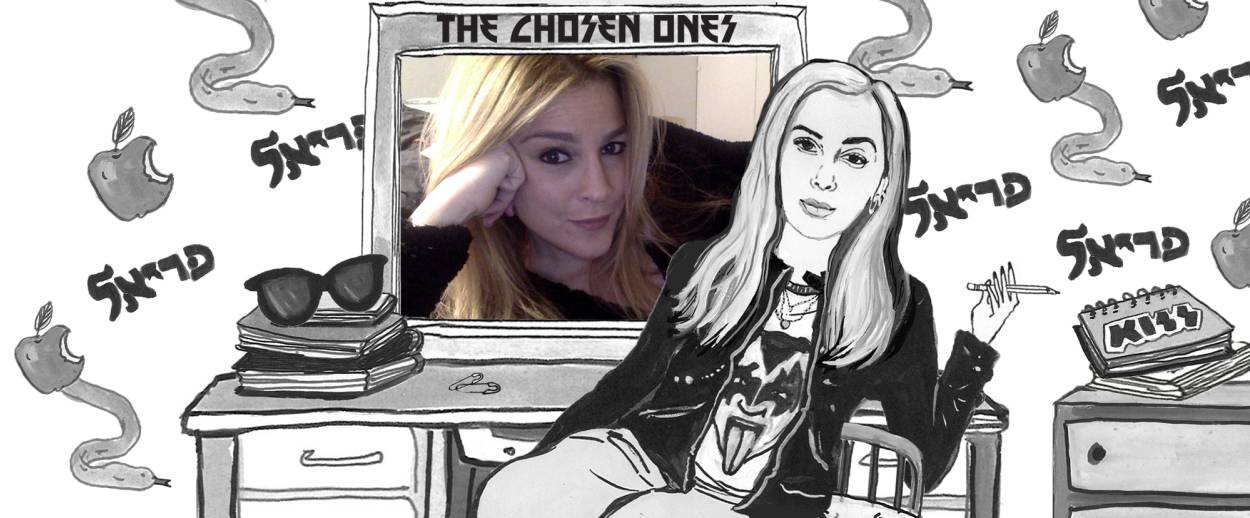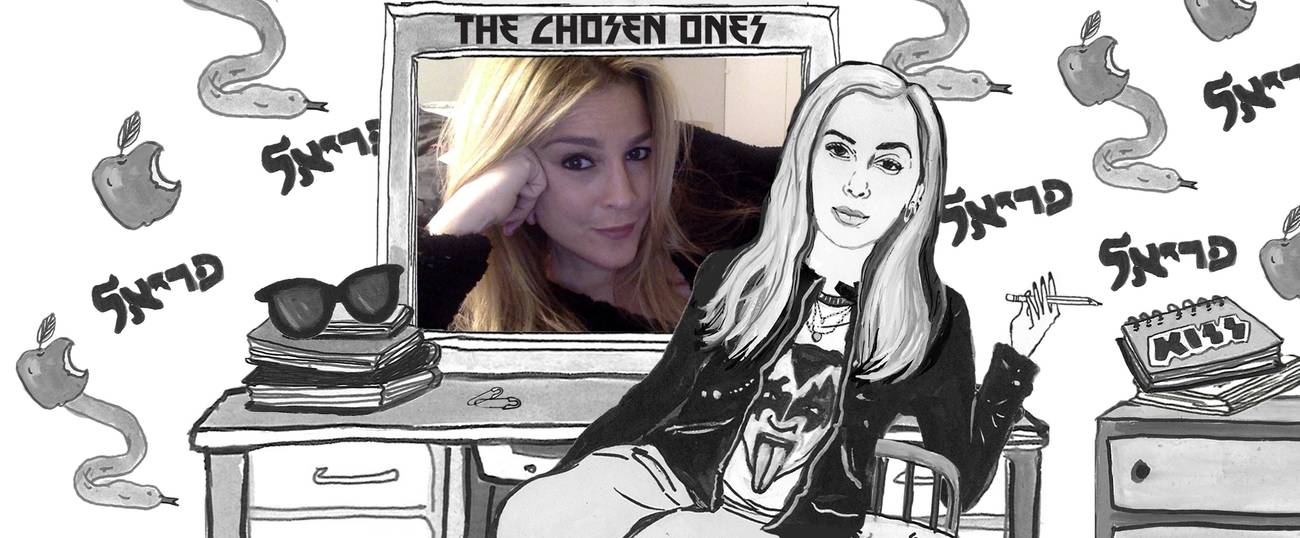The Chosen Ones: An Interview With Lori Barzvi
The beauty product entrepreneur on loss, taking risks, and why the day after Yom Kippur is her favorite




I felt like Lori Barzvi was a good idea for my last interview of 2016, a mostly shitty year, because her story is one of triumph in the face of failure, and hope in the face of tragedy. After her brother was killed in September 11, and then her father died a few years later, Barzvi, then in her mid-twenties, took major stock of her life. She left her marketing job in corporate America (and a steady paycheck) to pursue the riskier opportunity of becoming a small business owner.
Barzvi is the creator of My Solemate, a pumice stone and soap product that’s number one in its category on Amazon. She has lectured about being an entrepreneur at Yeshiva University, been featured on Good Morning America and twice in Forbes, in which she is refefrred to as “remarkable,” which is almost a big enough compliment. Oh, and she’s a huge advocate for doggie rescue, which makes her all the more lovable.
Periel Aschenbrand: I wanted to interview you now because I think you’re a prime example of triumph in the face of great adversity.
Lori Barzvi: People like my story so much because they like happy endings.
PA: Do you feel like it’s dishonest representation of you?
LB: No, but we don’t put our angst out there—people don’t really know what’s going on in other people’s life. I’ve accomplished a lot professionally and that’s nice, but mentally it’s difficult and the story that people want to believe is that I went through this tragedy, and now my life is perfect.
PA: I don’t think that’s true. I think people relate to you so much precisely because you have shown that even in the face of great tragedy, you can triumph. It’s not just about your success, but that rather that success and failure do not exist independently of one another. And that even in the face of great suffering, you forge ahead. I think that a lot of people—most people—relate to that. Because that’s most of our experiences. It’s what makes us human.
LB: Well you just made me see my whole being in a totally different way. I’ve been thinking people look at me and think that I have a perfect life, that I overcame everything and I’m an amazing brand new person and it’s almost made me mad at times when people praise me—I want them to know I suffer also.
PA: The most successful and brilliant and creative people always suffer. I think that people do know that. I think that’s the definition of being an inspiration. I think that part of your success is wrapped up in how relatable you are. You embrace your flaws and that’s so refreshing. I think we’re all disaster to some degree. I once had the distinct pleasure of accompanying Mikhail Baryshnikov to The Charlie Rose Show and Charlie asked him something about how successful he was and Misha said something like, “Well, half the time I feel like a total fraud,” and it was so profound because I think that’s true of all of us. It’s not one great failure and then 100 successes. It’s a hundred failures and then one success, and then more failure. To me that’s what your story emulates.
LB: This might be the most important conversation I’ve ever had in my life.
PA: Flattery will get you everywhere. To that end, you have the No. 1 best selling product in it’s category on Amazon. That’s a pretty big deal.
LB: I like to think so.
PA: You weren’t always an entrepreneur, right?
LB: No. I worked in corporate America for five years and then 9/11 happened and I lost my brother. I was working at a marketing company at the time. Three years later, my dad got lung cancer. He was in the restaurant business and in the middle of opening another restaurant. Once he knew he wasn’t getting better, he asked me to take his place.
PA: Were you surprised?
LB: Not really, he always wanted me to be an entrepreneur, he used to ask me when I was growing up, “Don’t you want to have your own business? Why would you want someone to tell you when to come and go?”
PA: Was he pretty renegade?
LB: Yeah. He came to this country from Israel, in his twenties, he was the second youngest of 12 kids, but he was the first one to come to America by himself. He became like the godfather of the family because he was so savvy. He was always the one who ended up employing his siblings.
PA: So he was pretty ballsy.
LB: Oh yeah. And he always wanted me and my brother to have our own businesses. But we both went the route of corporate America. I spoke to my brother on the day before 9/11 and he told me that he had been working too many hours, even though he had a great job at Cantor Fitzgerald. He felt like he had no quality of life and he was saying that he was thinking he was going to do something more entrepreneurial like going into the restaurant business with my dad. I guess he figured if he was going to work that hard, he may as well do that for himself.
PA: And then you figured the same thing.
LB: No. I didn’t have a choice. I got thrown into it. I didn’t choose it. But I didn’t feel like I could say no. I felt like I had to at least give it a shot. I worked there for a year and a half, trying to figure out how to run a restaurant. I was taking notes from my father on his death bed and tried to implement it but after a year and a half, I understood that it wasn’t going to be successful. I gave it my best shot but I was really unhappy and I figured that I suffered so much already and I didn’t think my father would want that for me, so I sold my share and got out.
PA: And then?
LB: And then I spent a lot of time alone and I started dancing.
PA: You became a stripper?
LB: Ha, no. I was dancing ballroom and salsa. And I was very lost and I had no idea what I wanted to do. After losing my brother and father in such a short time I felt a sense of joy in dancing that I thought I would never feel again. Dancing started my healing. I did that for many years and it was healing me so much that I said I want to give this back to other people so I decided to open a dance studio. The problem with that was that while my intentions were good and genuine, I knew nothing about the dance studio business and had no idea how to run a dance studio. I also think I didn’t really think it through. I think I thought I was going to open a dance studio and dance all day instead of running a business.
PA: I can understand how that would be problematic.
LB: Right. So in the process of all of this, my feet got wrecked from all the dancing. And I found myself sitting down in the shower everyday scrubbing my feet. I used to soap up my feet and then use a pumice stone and I kept forgetting the soap in the shower caddy. And I didn’t want to keep getting up because I’m really lazy, so one day when the same thing happened I found a nub of soap and I squashed it onto the pumice. And a light bulb went off.
PA: They say the best ideas are born out of necessity.
LB: And in the shower.
PA: How many years did you work on it?
LB: After I thought of combining them into one product, I had to figure out how to get it manufactured and produced. It took two years to go from an idea to being something people could hold in their hands. And that turned out to be the easy part. At the beginning, I didn’t know how to bring it to market. And I lost and spent a lot of time and money trying to figure that out.
PA: And then you found Amazon?
LB: After many years and giving up on the product, I went back to corporate America, thinking I would never do that again. And then fatefully, one day, I read something on Facebook about someone selling something on Amazon and that’s when I realized maybe I could sell my product there. So I learned everything I could about Amazon and how it worked, and I put my product on the site. Within 3 weeks it became a top ten best seller. So all in all it took me about 8 years to become an overnight success. Thousands and thousands of dollars and 8 years.
PA: That’s everyone’s overnight success story. What’s your favorite drink?
LB: Frozen Margarita.
PA: How do you eat your eggs?
LB: Sunny side up, extra crispy.
PA: How do you drink your coffee?
LB: Light and sweet, like me.
PA: What’s your favorite Jewish Holiday?
LB: Is it bad to say the day after Yom Kippur where we get to eat bagels and lox all day?
PA: Did you have a bat mitzvah?
LB: Not in the traditional sense. I had a 13th bday party in a nightclub.
PA: What did you wear?
LB: A leather dress.
PA: That’s so hot. What shampoo do you use?
LB: Anything that will make my hair more blonde.
PA: Gefilte fish or lox?
LB: That’s so hard.
PA: That’s what she said. Just kidding.
LB: Depends on who I’m with.
PA: What do you mean?
LB: I guess they both leave really stinky smells. That’s a really hard question. I really love them both.
PA: Okay. Five things in your bag right now?
LB: My asthma inhaler, lip gloss, red lipstick, poo poo bags for my dogs, and probably a stray earring.
PA: Favorite pair of shoes?
LB: My Louboutin booties. They’re actually my Steve Madden booties, but we don’t need to tell anyone that.
Periel Aschenbrand, a comedian at heart, is the author of On My Kneesand The Only Bush I Trust Is My Own.